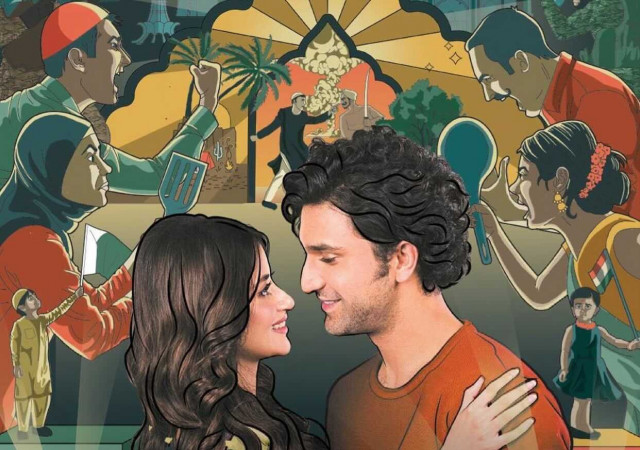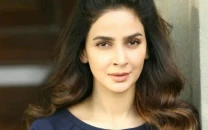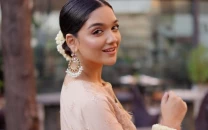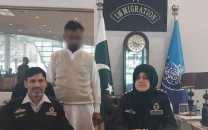‘Dhoop ki Deewar’ and the lure of a forbidden, cross-border romance
From Layla Majnun to Sohni Maahiwal, we are a society enamoured by the idea of doomed love

The threat of a ban has become somewhat a rite of passage for Pakistani films and television shows that make even the faintest attempt to question the current status quo. Dhoop ki Deewar has seen no exceptions. The release of the trailer of the web series saw an outcry from enraged Pakistanis, taking to Twitter to call for a boycott. The fact that the show released on June 25 through Zee5, an Indian streaming platform, didn’t help either.
Dhoop ki Deewar follows the lives of an Indian man and a Pakistani woman, played by real-life couple Ahad Raza Mir (Vishal) and Sajal Aly (Sarah), caught in the crosshairs of the Indo-Pak conflict wherein they suffer major personal losses. Connected in their grief, the two form a bond over the internet, one may even deem romantic. However, Umera Ahmed, the writer, has asserted in her official statement after the backlash that the series is not a love story but a “social tragedy.”
While the casting of Sajal and Ahad, a couple as famous for their marriage as they are for their acting credits, may be enough to counter the claim, the fact that the trailer focuses explicitly on a budding romance between an Indian and a Pakistani, as well as social pressures against it, should be enough to rest anyone’s case on the matter. To outright deny the romantic nature of the series is a disservice to the human relationships Dhoop ki Deewar (at least according to the trailer) attempts to bring to the surface.
The social tragedy is as clear in the trailer as the love story. The permissibility and nature of the romance are dictated by social factors such as escalating tension between the two nations. In fact, it is the very lure of forbidden cross-border love that has brought Dhoop ki Deewar the attention it has so far gathered. We are a culture enamoured by the idea of a doomed romance. From Layla Majnun to Sohni Maahiwal, stories of love transcending the boundaries of caste, creed, religion, and even nations, have been a fixture of popular culture in the region, both at home and across the border. The greater the odds, the larger the impact.
Vishal and Sarah’s romance in Dhoop ki Deewar is a love tantamount to treason in the eyes of the other characters, as well as the viewers at home. And yet, the intrigue of falling in love with the ‘other’ is too difficult to resist. The political turmoil is not lost on the viewer, with the violent backdrop being a key theme of the story, adversely affecting both the Pakistani and the Indian in equal measure. Stories such as these attempt to strip away the burden of collective national ‘duty’, which in this case is to antagonise the other, and focus instead on the individual, who the character is and the relationships they form when the expectation to hate is taken away. The other is no longer an amorphous, threatening mass forever looming over our heads, and the monstrosity is stripped away to reveal what so many are not ready to see: a reflection of ourselves.
Dhoop ki Deewar is not the first attempt at humanising the other side, which really should not be a matter of contention, since they are, essentially, humans making human choices to love or hate. Yash Chopra’s Veer Zara attempted to do much the same. Starring Shah Rukh Khan as an Indian Airforce pilot Veer and Priety Zinta as the Pakistani Zara, it is a story of lovers divided by borders and social expectations, powerless in the face of the decisions their countries make on the political front.
The criticism for Dhoop ki Deewar has so far not been limited to just the romance: there has been an outcry against the decision to make the leading woman in the series a Pakistani. The reaction to the gender dynamics of the relationship does not come as a surprise. In films such as Veer Zara, the female character settles in India, effectively conveying a kind of conversion from Pakistani to Indian, from Muslim to Hindu. In times rife with phrases such as ‘Love Jihad’ and a stream of news stories about forced conversions, such reactions are expected. Personal relationships have often been used, in fact and fiction, as grounds for conflict and conquest.
Dhoop ki Deewar (hopefully) subverts this narrative, giving power to the female and in such, a welcome change. The question remains as to why audiences gravitate towards tragic stories of star-crossed lovers. Other than the emotional catharsis they may offer, or even the excitement of engaging with a story with such high stakes, some may claim that what lies at the centre of a tragic love story is rebellion. To rebel against the idea of who can and cannot be loved, as well as how much one can love, becomes a fight for individual freedom in the face of violence that leaves one in many ways, powerless. The story becomes about the individual, their goals and aspirations - not conflated with national political interests. It becomes the story of Layla and Majnun, Romeo and Juliet, Veer and Zara, perhaps even Vishal and Sarah. The ‘dhoop ki deewar’ is porous, nothing more than an imagined boundary and love can take advantage of its lack of solidity at any time.
Have something to add to the story? Share it in the comments below.


















COMMENTS
Comments are moderated and generally will be posted if they are on-topic and not abusive.
For more information, please see our Comments FAQ